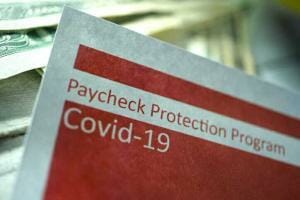The IRS once again addressed the deductibility of eligible Paycheck Protection Program (PPP) loan expenses.
On Wednesday November 18th, the IRS released Revenue Ruling 2020-27 and Revenue Procedure 2020-51. These rulings did two things. First, they reminded taxpayers that business expenses covered by PPP loans cannot be deducted if the taxpayer reasonably expects for their loans to be forgiven. Second, they provided a safe harbor for deducting expenses when forgiveness is denied or when forgiveness is not sought.
Denying Deductions in Loan Forgiveness
Like the guidance that preceded it, Revenue Ruling 2020-27 states that otherwise deductible PPP-eligible loan expenses are not deductible if the business reasonably anticipates their PPP loans will be forgiven. This is true regardless of when the business seeks forgiveness or expects their forgiveness to be granted.
The ruling presents two situations that help illustrate this rule.
Situation 1
Taxpayer A applied for forgiveness in 2020 but had not been notified of forgiveness at the end of the year. The taxpayer satisfied all the requirements for forgiveness under the CARES Act and reasonably believed their forgiveness was forthcoming. The expenses covered by their PPP loan are not deductible in 2020.
Situation 2
Taxpayer B did not apply for forgiveness in 2020 but planned to do so in 2021. Taxpayer B satisfied all other requirements for forgiveness under the CARES Act and believed their forthcoming forgiveness application would be accepted by the lender. The expenses covered by their PPP loan are not deductible in 2020.
In both scenarios, Taxpayers A and B both reasonably expect for their loans to be forgiven, therefore the expenses covered by their PPP loan proceeds are not deductible. These situations amplify the guidance released in Revenue Ruling 2020-32 by illustrating that the date when forgiveness is sought (or the date when forgiveness is granted) is of no consequence. The determining factor whether deductions are permitted is whether the loan is expected to be forgiven at some point in the near future.
Safe Harbor for Deducting Eligible PPP Loan Expenses
Deductions for eligible PPP program expenses may be deductible if taxpayers meet certain safe harbor guidelines. Revenue Procedure 2020-51 permits taxpayers to deduct those expenses if (1) their loan forgiveness applications are denied, or (2) they choose not to seek loan forgiveness.
The revenue procedure outlines two scenarios that would enable taxpayers to qualify for the safe harbor under Revenue Procedure 2020-51:
Scenario 1
- The taxpayer received a PPP loan that paid for eligible expenses that were incurred in 2020.
- The taxpayer reasonably expects their loan to be forgiven.
- The taxpayer applied for forgiveness before the end of the year.
- In a subsequent tax year, their application – in whole or in part – was denied.
Scenario 2
- The taxpayer received a PPP loan that paid for eligible expenses that were incurred in 2020.
- The taxpayer reasonably expects their loan to be forgiven.
- The taxpayer applied for forgiveness before the end of the year.
- In a subsequent tax year, the taxpayer withdraws their application and chooses not to seek forgiveness for their PPP loan.
In both scenarios, the taxpayers qualify for safe harbor treatment and could deduct their eligible program expenses in 2020 or 2021 depending on when the forgiveness application is denied or withdrawn. Taxpayers can file amended returns to claim these deductions if necessary. Under the safe harbor guidelines, taxpayers must attach a statement to their originally filed or amended return for the year they are claiming the deductions that includes the following information:
- Their business’s identifying information
- Statement specifying whether their application was denied or whether they chose not to pursue forgiveness
- Statement specifying whether they are deducting expenses in the current or subsequent tax year
- Amount of PPP loans received
- Amount of PPP loan forgiveness denied or not sought
- Amount of eligible expenses reported on their return
Bottom Line
These rulings double down on the guidance that has already been released about the deductibility of eligible PPP loan expenses. This gives us the clarity we need to confidently report PPP proceeds and associated expenses on our tax returns. If you have questions how this clarifying information affects your business, contact a LaPorte professional.

